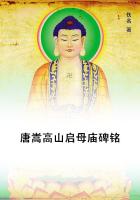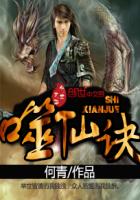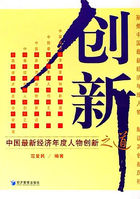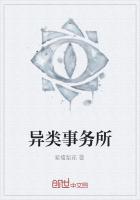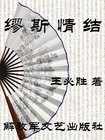A monotonous chant on three notes, which must date from the first Pharaohs, may still be heard in our days on the banks of the Nile, from the Delta as far as Nubia. At different places along the river, half-made men, with torsos of bronze and voices all alike, intone it in the morning when they commence their endless labours and continue it throughout the day, until the evening brings repose.
Whoever has journeyed in a dahabiya up the old river will remember this song of the water-drawers, with its accompaniment, in slow cadence, of creakings of wet wood.
It is the song of the "shaduf," and the "shaduf" is a primitive rigging, which has remained unchanged since times beyond all reckoning. It is composed of a long antenna, like the yard of a tartan, which is supported in see-saw fashion on an upright beam, and carries at its extremity a wooden bucket. A man, with movements of singular beauty, works it while he sings, lowers the antenna, draws the water from the river, and raises the filled bucket, which another man catches in its ascent and empties into a basin made out of the mud of the river bank. When the river is low there are three such basins, placed one above the other, as if they were stages by which the precious water mounts to the fields of corn and lucerne. And then three "shadufs," one above the other, creak together, lowering and raising their great scarabaeus' horns to the rhythm of the same song.
All along the banks of the Nile this movement of the antennae of the shadufs is to be seen. It had its beginning in the earliest ages and is still the characteristic manifestation of human life along the river banks. It ceases only in the summer, when the river, swollen by the rains of equatorial Africa, overflows this land of Egypt, which it itself has made in the midst of the Saharan sands. But in the winter, which is here a time of luminous drought and changeless blue skies, it is in full swing. Then every day, from dawn until the evening prayer, the men are busy at their water-drawing, transformed for the time into tireless machines, with muscles that work like metal bands. The action never changes, any more than the song, and often their thoughts must wander from their automatic toil, and lose themselves in some dream, akin to that of their ancestors who were yoked to the same rigging four or five thousands years ago. Their torsos, deluged at each rising of the overflowing bucket, stream constantly with cold water; and sometimes the wind is icy, even while the sun burns; but these perpetual workers are, as we have said, of bronze, and their hardened bodies take no harm.
These men are the fellahs, the peasants of the valley of the Nile--pure Egyptians, whose type has not changed in the course of centuries.
In the oldest of the bas-reliefs of Thebes or Memphis you may see many such, with the same noble profile and thickish lips, the same elongated eyes shadowed by heavy eyelids, the same slender figure, surmounted by broad shoulders.
The women who from time to time descend to the river, to draw water also, but in their case in the vases of potters' clay which they carry--this fetching and carrying of the life-giving water is the one primordial occupation in this Egypt, which has no rain, nor any living spring, and subsists only by its river--these women walk and posture with an inimitable grace, draped in black veils, which even the poorest allow to trail behind them, like the train of a court dress.
In this bright land, with its rose-coloured distances, it is strange to see them, all so sombrely clothed, spots of mourning, as it were, in the gay fields and the flaring desert. Machine-like creatures, all untaught, they yet possess by instinct, as did once the daughters of Hellas, a sense of nobility in attitude and carriage. None of the women of Europe could wear these coarse black stuffs with such a majestic harmony, and none surely could so raise their bare arms to place on their heads the heavy jars filled with Nile water, and then, departing, carry themselves so proudly, so upright and resilient under their burden.
The muslin tunics which they wear are invariably black like the veils, set off perhaps with some red embroidery or silver spangles. They are unfastened across the chest, and, by a narrow opening which descends to the girdle, disclose the amber-coloured flesh, the median swell of bosoms of pale bronze, which, during their ephemeral youth at least, are of a perfect contour. The faces, it is true, when they are not hidden from you by a fold of the veil, are generally disappointing.
The rude labours, the early maternity and lactations, soon age and wither them. But if by chance you see a young woman she is usually an apparition of beauty, at once vigorous and slender.
As for the fellah babies, who abound in great numbers and follow, half naked their mammas or their big sisters, they would for the most part be adorable little creatures, were it not for the dirtiness which in this country is a thing almost prescribed by tradition. Round their eyelids and their moist lips are glued little clusters of Egyptian flies, which are considered here to be beneficial to the children, and the latter have no thought of driving them away, so resigned are they become, by force of heredity, to whatever annoyance they thereby suffer. Another example indeed of the passivity which their fathers show when brought face to face with the invading foreigners!

